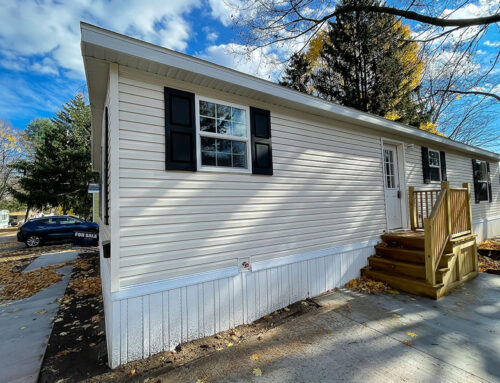Kay and I met at a dinner party in Jersey City years ago when she was looking for a real estate investing mentor and I was just starting to think about taking investment courses. Since then, I’ve gone on to mentor new investors. Kay, on the other hand, didn’t move beyond her initial search for guidance and stuck with her desk job—until recently, that is. Finally deciding to leave the corporate job to start her own business in real estate investing, she called me up to ask about how to buy a foreclosure property in NJ. She’d read that she needed to attend an auction, but didn’t want to go in without knowing exactly what she was getting into. Since she still hadn’t found a mentor she liked, she hoped I didn’t mind answering her novice questions. Of course, I didn’t. Not only was I capable of speaking to her from experience, but I also wanted to because she is an old friend.
The Process of Buying Foreclosure From an Auction in NJ
Since New Jersey is a judicial foreclosure state, when a bank, credit union, or other lender wants to foreclose on a home they have to file a lawsuit against the homeowner first. Along with the filing, they will generally ask the court to send the property to auction. The purpose of this lawsuit is to recoup at least some of the mortgage holder’s losses by selling to the highest bidder. Assuming the homeowner doesn’t contest the lawsuit, the auction is usually granted and conducted by the local county sheriff’s office. So, the foreclosure process itself is a little more complicated in New Jersey than in other states.
But, for investors like Kay, the appeal of buying a foreclosure auction home is pretty simple: they’re potentially cheap to acquire. Starting bids, which can be found online with the sheriff’s office, are typically low. If investor competition for a particular house is also low, it’s possible to purchase a property for far less than market value and leave plenty of room for a nice rehab and an even nicer potential profit. And, that helps to make the pursuit of foreclosures look like one worth engaging in.
The potential pitfalls of such a pursuit, however, are enough to make you reconsider bidding at one. At least, they should be. First, when it comes to the auction itself, the terms of sale are both harsh and non-negotiable. It doesn’t matter if you’re bidding at the Hudson County Sheriff’s Sale or in Bergen or Atlantic counties. For example, good faith deposits of at least 20% are required and have to be paid in cash or by a cashier’s check, certified check, or other cash equivalents on the day of the auction—usually, before the sale even begins. And, there are no refunds. So, even if you have buyer’s remorse immediately after winning the bid, you’re out of luck and out of cash.
Also, in most counties, the balance for your new New Jersey investment property is due in 30 days. But, interest may start accruing weeks before. So, you’ll need to check with your county about rates and timelines, then make the extra effort to pay in full before the balance is due. You don’t want anything to eat more out of your potential profit than is absolutely necessary—not even a few percentage points. Of course, you also want to make sure you don’t bid on a home you don’t absolutely want to buy. Should you back out of closing, you’ll pay for it with more than just your deposit. You could be assessed court fees, charged for the costs of re-auctioning the property, and have to pay the difference if a second auction yields a lower winning bid.
But, winning the bid and jumping through all the hoops for buying a foreclosed home in NJ doesn’t guarantee the property becomes yours. Time has to be given to the court to approve the sale, but time is also given to the homeowner to get current on their payments and redeem the house. It’s true that the redemption period usually ends the moment the court authorizes the auction. But, exceptions are made. In most counties, homeowners have 10 days after the sale to get current on their loans and stay in possession of the house—even if they’re paid up. And, in counties like Monmouth, defaulted homeowners may be given a 60-day repayment plan provided they file for bankruptcy anytime before they’re issued the deed. Either scenario, however unlikely, will disrupt your renovation plans and your timeframe for selling should you actually be granted possession.
Unfortunately, the potential for encountering trouble doesn’t end the moment the court approves the sale or the homeowner fails to redeem the property. The home itself is likely to be in rough shape at best and prohibitively expensive to repair at worst since homeowners who can’t pay their loans aren’t generally able to care for their homes. Plus, it takes approximately three years to complete the foreclosure process in New Jersey—one of the longest timelines in the country. That’s an additional three years that the house might have been neglected or vandalized. And, you probably won’t know just how bad it is—or, how much it’s going to cost you—until you gain possession. Inspections are rarely allowed before bidding on auction homes in New Jersey. So, what you don’t see is what you’re going to get, whether you want it or not.
The good news, however, is that because the foreclosure process takes so long here in the Garden State, there is time to buy a good investment property from distressed homeowners before their property goes to auction. But, to do that, you’ll need to have a lead generation system in place that helps you find motivated sellers who may be in an “ugly” situation. If your system helps them find you, too, it’s even better.
Avoid the Pitfalls of an Auction by Dealing Directly With Homeowners
When I think about the elements that make a good friendship, honesty is certainly one of them. And, very often, that includes helping someone avoid making the kind of financial mistakes that have the potential to put their own business in ruin. Maybe that sounds dramatic. But, when I first started investing in real estate I bought a foreclosure auction home that had a very dramatic—almost devastating—impact on my business. I vowed I’d never buy a home I couldn’t inspect again and that I’d do my best to steer others away from doing the same, particularly new investors, and friends, like Kay.
And, when I became an independently owned and operated HomeVestors® franchisee, I never had to attend an auction again. That’s because motivated home sellers looking for “solutions for ugly situations®” find me before they lose their home in the New Jersey courts. They’re able to do this because they’ve seen one of the many “We Buy Ugly Houses®” ads that are on billboards, television, or the internet and know that HomeVestors® is a name they can trust. So, when they call for help, those calls come to me or to one of the other local HomeVestors® franchisees. And, we’ll try to help those financially distressed homeowners avoid the court.
Deal directly with New Jersey homeowners to acquire the best deals. Contact HomeVestors® today about how you can take advantage of the “We Buy Ugly Houses®” marketing campaign, too.
Each franchise office is independently owned and operated.
Contact
"*" indicates required fields





